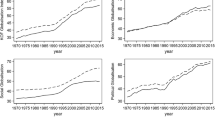Abstract
In my essay, I will give some of my perceptions on the way science, technology and innovation is going to determine the economic and political power of the nations. The rapid paradigm shifts that are taking place in the world as it moves from super power bipolarity to multipolarity, as industrial capitalism gives way to green capitalism and digital capitalism, as information technology creates netizens out of citizens, as aspirations of the poor get fueled by the increasingly easier access to information, as the nations move from ‘independence’ to ‘interdependence,’ as national boundaries become notional, and as the concept of global citizenship gets evolved, we will be full of new paradigms and new paradoxes, there is no doubt that the rapid advance of science and technology will directly fuel many of these.
Similar content being viewed by others
Notes
In the early 2000 Hazare led a movement in Maharashtra state which forced the state government to enact a revised Maharashtra Right to Information Act. This Act was later considered as the base document for the Right to Information Act 2005 (RTI), enacted by the Union Government. It also ensured that the President of India assented to this new Act. In the Florini (2007) The Right to Know: Transparency for an Open World, Shekhar Singh’s essay “India: Grassroots Initiatives” tells us about the Anna Hazare’s movement.
References
Bush V (1945) Science the endless frontier: report to the President on a program for postwar scientific research. U.S. Government Printing Office, Washington D.C
Florini A (2007) The right to know: transparency for an open world. Columbia University Press, New York
Mashelkar RA (2005) India’s future: ‘IT’ as in ‘Indian Talent’. Convocation address of the International Institute of Information Technology, Hyderabad. http://www.csir.res.in/External/Heads/aboutcsir/leaders/DG/dgspeech4.htm. Accessed 5 Oct 2015
Mashelkar RA (2008) Indian science, technology, and society: the changing landscape. Technol Soc 30(3–4):299–308. doi:10.1016/j.techsoc.2008.04.017
Turaga UT, Tripathi AK (2015) Science, technology, and society studies: Indian perspectives. In: Holbrook JB, Mitcham C (eds) Ethics, science, technology, and engineering: a global resource, vol 4, 2nd edn. Macmillan Reference USA/Cengage Learning, Farmington Hills, pp 63–68
Acknowledgments
This paper is an edited version of Bose–Einstein Lecture ‘Science, Technology, Innovation: Their Impact on Economic and Political Power’ which Professor Raghunath Mashelkar delivered at India International Centre, New Delhi, on December 13, 1999. The paper is of great significance to the special issue ‘Philosophy of Technological Culture’ in many ways. The interconnection of science, technology and innovation and its enforcement of paradigm seem to open a horizon for philosophy of technology and culture. The Bose–Einstein intellectual bond was both imminent and durable. It is only pertinent that the first ever English translation of Einstein’s papers on relativity originally published in German was made by Bose and his distinguished colleague Meghnad Saha and printed in Calcutta. The world ‘boson’ to describe elementary particles that obey the Bose–Einstein statistics is now a part of language and culture. The paper adds a cultural dimension to the development of science, technology and innovation.—Note from the Guest Editor.
Author information
Authors and Affiliations
Corresponding author
Additional information
This essay is adopted from Bose–Einstein Lecture ‘Science, Technology, Innovation: Their Impact on Economic and Political Power’ which I delivered at India International Centre, New Delhi, on December 13, 1999.
Rights and permissions
About this article
Cite this article
Mashelkar, R.A. Impact of science, technology and innovation on the economic and political power. AI & Soc 32, 243–251 (2017). https://doi.org/10.1007/s00146-015-0639-y
Received:
Accepted:
Published:
Issue Date:
DOI: https://doi.org/10.1007/s00146-015-0639-y




